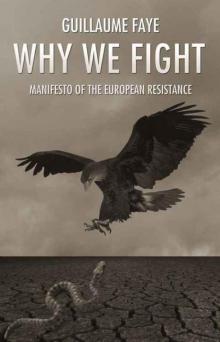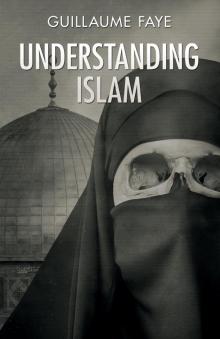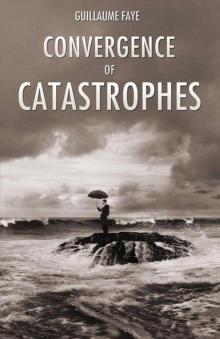Why We Fight, page 23




Anti-populism marks the final triumph of the isolated, pseudo-humanist, and privileged political-media classes — which have confiscated the democratic tradition for their own profit.
For some time now, the term ‘people’ has had bad press. One prefers to speak of the ‘republic’ — an equally fluid term which has been turned against its original meaning. For the intellectual-media class, ‘people’ means petits blancs — the mass of economically modest, non-privileged French Whites — who form that social category which is expected to pay its taxes, renounce all privilege, and above all keep quiet. This is why massive naturalisations, jus soli, and the enfranchisement of foreigners in local elections have been introduced: to ‘change the people’.
The dominant ideology pursues a threefold strategy: first, to make ethnic Europeans ‘correct’ and, if possible, to restrain their reproduction; second, to leave all real power in the hands of international finance; and third, to assure the political class of ample financial rewards. This is the soft, modern form of oppression.
A situation like this is inherently fragile: one wonders if the anti-populist, anti-racist politicians ever suspect that once a certain numerical threshold is passed, their Muslim and alien charges will toss them into the rubbish chute of history?
(see democracy; people)
* * *
Preference, European; national preference, alien preference
A political notion inherited from Greek democracy, which accords superior rights to the City’s natives — to ‘citizens’.
It’s an idea of good sense — practiced by all peoples on Earth, except by sick Western societies (France particularly) — the idea that citizens in their own country ought to have an advantage of rights over foreign residents. What else could the notion of ‘citizenship’ — which the Left evokes in every realm, but whose principles it thoughtlessly violates — possibly mean?
Being a native European has become a handicap in our ethnomasochistic societies. French (or European) preference, by an incredible ideological turn, is now considered ‘racist’. In France and Belgium there’s even discussion of opening the civil service to foreigners.
The notion of ‘national preference’ is the basis of international law and practiced in every country of the world. Only in Europe is it diabolised and, in a blatant denial of justice, condemned by the courts — constituting in effect a usurpation of the principle of international reciprocity. No country accords equal rights to Europeans (let alone superior rights), but Europeans are somehow obliged to grant equal or superior rights to their foreign residents.
*
The so-called ‘anti-racist’ laws, like massive social welfare programs, lead, objectively, to a situation in which foreigners (even illegal immigrants) are privileged, because once they were allegedly victims of xenophobic exclusion and hatred. Official anti-racism in this way metamorphosises into an explicit anti-European racism.
Official policy thus dictates that aliens are to be the beneficiaries of ‘positive discrimination’. Protected by specialised associations, championed by the media, recipients of innumerable welfare services and payments, allegedly victimised, foreigners, objectively speaking, are privileged, in effect. And these privileges continue to grow along with the incessant arrival of new immigrants. Foreign preference is indeed now the rule — though justice and good sense would seem to dictate a situation of European preference. In Morocco, the rule is ‘Moroccan preference’ — in India, ‘Indian preference’ — everywhere this is the case, except in Europe.
The courts’ condemnation of Catherine Mégret, the mayor of Vitrolles,[209] for allocating 5,000 francs to every newborn child of French or European parentage, reveals the degree to which the rule of ideology, fanaticism, and despotism afflicts all who follow the natural law of favouring one’s own people.
The refusal of national preference inevitably culminates in foreign preference: another sign that egalitarian ideology has become crazy, that it has inverted the egalitarian principle to favour the superiority of aliens. Foreign preference is a collective pathology, imposed by the reigning elites, though it won’t last. Such an abnormal situation can only lead — and this will be for the better — to an extremely grave crisis. Social harmony and peace are possible only with the Aristotelian principle of ‘every City its own privilege’.
(see ethnomasochism; race, racism; xenophilia)
* * *
Presentism
Cult of the present, of the moment, of fashion — a cult distinct to Western society — forgetful of the past and indifferent to the future.
Presentism is a form of blindness — it’s the behaviour of ‘those whose eyes are on the ground, not the sky, not on what’s before or behind them’ — in the expression of the Breton painter and identitarian Yann-Ber Tillenon.[210]
The long-term is never taken into account. Future generations don’t count, the notion of lineage, like that of foresight, is absent. Only the ‘present generation’ counts. But when a fashion ceases to be fashionable, ‘its look’, as Olivier Carré[211] says, ‘becomes tacky’.
Presentism fosters contempt for the survival of one’s people. It’s a consequence of a narcissistic individualism and the bourgeois spirit. It’s become a way of refusing a common future and a common past, memory and foresight, enrootment and collective ambition, identity and continuity. Contemporary civilisation is smothered in presentism, which makes it extremely fragile, since it refuses to anticipate the crises that will inevitably befall it; for example, the threat of ethnic civil war, the inescapable clash with Islam, the dramatic economic consequences of an ageing population, the ecological effects of increased pollution and higher atmospheric temperatures, etc. Presentism affects the public spirit in general, as well as large economic groups, whose strategies are geared to short-term financial performance; it similarly limits political ambitions to the horizon of the next election and the international community fails to reduce the harmful emission of polluting gases. The fate of coming generations has become, in a word, the least of this civilisation’s concerns.
Presentism is both the infantile demand for everything right now and the undivided reign of the hic et nunc.
(see economism; modernity)
* * *
Progress, progressivism
The belief that history is an ascending movement toward the constant improvement of the human condition.
The idea of progress has been in crisis for a long time (the famous ‘disillusions of progress’), since progressivism insists that things are always getting better. The idea, however, is undermined from within by a generalised pessimism and the collapse of any confidence in the future, just as its achievements constantly fall short of expectation. The ‘happiness of peoples’, rhapsodised by Victor Hugo,[212] had no rendezvous in the Twentieth century — just the opposite. What’s particularly mind-boggling is that progressive ideology (like its modernist counterpart) continues to run in circles, even though the world it has created is heading, full speed, in a fog, toward disaster.
*
The idea of progress — central to the ‘modern’ vision of the world since the Seventeenth century — is a secular and materialist offshoot of the religious doctrines of salvation. The Twenty-first century will not bring the end of history, nor the world prosperity of a universal state, but a terrible acceleration of history and a heightening of its tragic essence. Against progressivism, we would do well to substitute the metamorphic vision of history that Heraclitus[213] and Nietzsche inspired: nothing is immutable, nothing is linear. Life is becoming and thus full of surprises. Through a dialectical contradiction that frequently occurs in history, progressivism and ideologies of history’s end have actually provoked a resurgence of history — because of the catastrophes they themselves are producing.
As for ‘scientific progress’, it possesses, let us repeat, nothing that is qualitative; it is purely quantitative and neutral; it even leads to disaster if not mastered (such as when it succumbs to purely market or profit motives) — or it can lead to significant benefits if thought out, planned, and ordered by the cold lucidity of a political will.
(see convergence of catastrophes; history; modernity)
* * *
Promethean
The central characteristic of the European’s tragic mentality.
Prometheus gave man fire and for this the gods punished him. Chained to a distant, isolated rock, an eagle ate at his liver every day, which he grew back every night. European man possesses an inner fire that consumes him, destroys him, but at the same time elevates him. He is both suicidal and self-constructing. Heidegger, after the Greek deïnotatos, called him ‘the most risky’.
Unlike the ‘submission to God’ advocated by the salvation religions, Prometheanism in European history is distinguished by a will to ‘equal the divine’. It combines the will to titanic power (in the Jüngerian[214] sense), hubris, rationality, and risk-taking. Neither ‘good’ nor ‘evil’, neither beneficial nor detrimental, it is an inner force that must be ceaselessly mastered. It’s to be found among entrepreneurs and among artists, scientists, and statesmen. The allegory of Goethe’s Faust, like that of Don Juan, perfectly translates this Prometheanism, which overarches the European tradition. Prometheanism is both force and feebleness.
It’s a force that produces a defiant, challenging mentality, it’s a feebleness that risks succumbing to short-sightedness and self-destructiveness (as depicted in Wagner’s The Twilight of the Gods).[215]
Prometheanism can be defined as an energy that comes from ‘the contradiction of opposites’. Like a chariot harness, it is to be wilfully and forcefully used, for its energy is order-creating.
(see personality, creative; tragedy)
R
Race, racism, anti-racism
A genetically distinct population.
The idea of a ‘pure race’ is obviously not a serious one. It’s the racial fact that counts. A race can be the stabilised product of an ancient melange. Contemporary genetics, out of favour with the dominant ideology, has well and truly confirmed humanity’s division into genetically statistical populations.
*
Races are not so much distinguished by phenotypic differences (skin colour, hair, height, etc.) as by genotypic variations affecting temperament and mental abilities — along with innate physiological and biological differences.
In reference to Henri Vallois’ [216] work, Pierre Vial explains that, ‘Identity rests, at root, on a biological reality — a reality that has been the subject of physical anthropology . . . This biological belonging conditions numerous human characteristics, both at the individual and collective levels. The man on the street, still possessing a bit of common sense despite the media’s ceaseless brainwashing, well knows that there’s a difference between a Senegalese and someone from the Auvergne. Difference here doesn’t necessarily imply inferiority or superiority’.[217]
The ethnodifferentialism Vial invokes differs significantly from the ambiguous concept of ethnopluralism. Ethnodifferentialism refuses all cohabitation with different peoples in the same territory, just as it refuses racial colonisation or domination — while ethnopluralism potentially leads to disaster — supporting, as it does, the ‘communitarian’ cohabitation of different peoples within the same political territory — a cohabitation that has never succeeded in history and inevitably leads to racism and racial conflict. The notion of race doesn’t exhaust that of ethnicity. Race is the biological constituent of ethnicity.
*
For strictly dogmatic reasons, the one-track thought (la pensée unique) of the dominant ideology denies even the existence of races (with the pseudo-argument that individual genetic differences are more important than differences between racial groups). It claims it wants to legally combat ‘racism’ — which is demonised in the way Victorians demonised libertinism. But how, one wonders, can something that supposedly doesn’t exist be condemned? And how is it even possible to have ‘racism’ if races are fictitious?
Anti-racism, the indispensable viaticum of the self-righteous, is actually a form of xenophilia (the valorisation of the ‘Other’) and of race-phobia. Obsessed and terrified by the fact of race — a major problem with the advent of multi-racial society and the problems it brings — Western ideology has succumbed to both race-phobia and, contradictorily, race-mania. To declare oneself ‘anti-racist’ and to denounce racism are today an obligatory propriety for all ideologues, artists, politicians, and journalists, on the Left and the Right — an obligation as necessary as proclaiming oneself a ‘good Muslim’ in Saudi Arabia.
In Europe we’ve reached the absurd point where whoever affirms the ‘inequality of races’ or the ‘superiority of the White race’ (true or not, it doesn’t matter) is accused of ‘racial hatred’, even if these affirmations are respectful of other races. Worse: ‘to be racist’ today (see the case of the Austrian leader of the FPÖ, Jörg Haider),[218] has nothing to do with seeing the ‘Other’ as inferior or with threatening this ‘Other’, but simply with defending one’s own identity or defending oneself from the invasion. This suggests that European elites might have some sort of psychoanalytical problem with race — not unlike the one Victorians had with ‘sex’. Fixated on the question of race, anti-racists repress their own morbid instincts and concealed obsessions. ‘Race’ for them is some sort of devilish spirit that needs to be exorcised. Anti-racism, as such, becomes an ideological exorcism.
Africans or Asians, in contrast, speak of race and the fact of race as if it were perfectly natural. Arabs and Africans have also recently published works (in France and Great Britain) asserting their intrinsic superiority over ‘Whites’: Muslim leaders have even affirmed the need ‘of eradicating Whites from the planet’. They have never been prosecuted by French authorities. One might conclude from this that the elites don’t consider ‘anti-White’ racism dangerous, since it’s implicitly assumed that the White man will always defend himself and be dominant. This implies a certain contempt for other races — for it assumes that Whites will always dominate and that non-Whites are congenitally handicapped and in need of protection. In any case, it demonstrates the repressed racism of the dominant anti-racist ideology.
*
‘Racial hatred’ — an evidently absurd sentiment that reproaches other humans not for their acts but for their being — is an inevitable offshoot of multi-racial society. All multi-racial societies are multi-racist. None have ever functioned in harmony. They all generate discriminations.
On the subject of race, the dominant ideology has entangled itself in innumerable and insurmountable contradictions: affirmative action, quotas for Blacks, etc. One recognises the existence of races, though without recognising their legitimacy. The anti-racism of militants favouring racial quotas (for example, such as those demands for Blacks made by the Égalité collective)[219] is an expression of the most pronounced racism — and has the effect of racialising society.
Nothing, moreover, is ever said about ‘anti-White racism’, which is never repressed, though it’s always present. Racism is seen in one way: the ethnic European alone is intrinsically guilty of this original sin.
*
At the end of the Nineteenth century, the neologism ‘racism’ had neither the same meaning nor the same present pejorative sense. It designated a doctrine that sought to explain differences between peoples and civilisations on the basis of their racial composition — what today we would call a ‘genetic’ explanation for a people’s general character. And, it’s everywhere ignored, the first self-proclaimed ‘racists’ — like Dr. Jules Soury,[220] René Martial,[221] or Jeremy Salmon — were partisans of miscegenation! For these racial pioneers, genetic crosses were the best way of achieving a ‘race of aptitude’ — wherever ‘pure races’ had failed because of their excessive specialisation. Like horses or dogs, they thought the human race was to practice selective cross-breeding in order to obtain the best results. Originally, then, racism was a doctrine of miscegenation. But thereafter it was added to every sauce — given that its powerful, emotional connotations no longer mean much anymore.
One is accused of ‘racism’ in the West on the basis of the most extravagant claim: whoever defends his identity and homeland from alien colonisers is deemed a ‘racist’. Due to some magical quality, Europeans alone produce racist theories. One forgets, for example, the numerous racist and supremacist anti-White positions taken by the African disciples of the Senegalese sociologist Cheikh Anta Diop[222] — whose work the current leaders of the new South Africa or Zimbabwe never stop spreading — without offending anyone.
Racism today is confused with xenophobia. It’s not even a question of racism or anti-racism, but of affirming the importance of race in constituting humanity. Biological differences in this sense are a source of richness; they become sources of conflict only when racial barriers cease to exist. As De Gaulle explained, France is obviously a country of the White race, and like every such country, it’s perfectly able to welcome a small number of minorities (like Blacks from the French West Indies), but it certainly can’t become a multi-racial society without generating unmanageable conflicts. This is the case with every people. For those lacking a minimum of biological homogeneity are threatened in the long run with internal decomposition. The racial fact is not everything, of course. But it’s there. To neglect it inevitably leads to catastrophe.
To make the notion of ‘race’ a taboo, to turn it into a quasi-religious prohibition, nullifies it — which has the added consequences of reversing its effects, for like every ‘family secret’, it becomes a time bomb. Its repercussions are easily imagined.



















